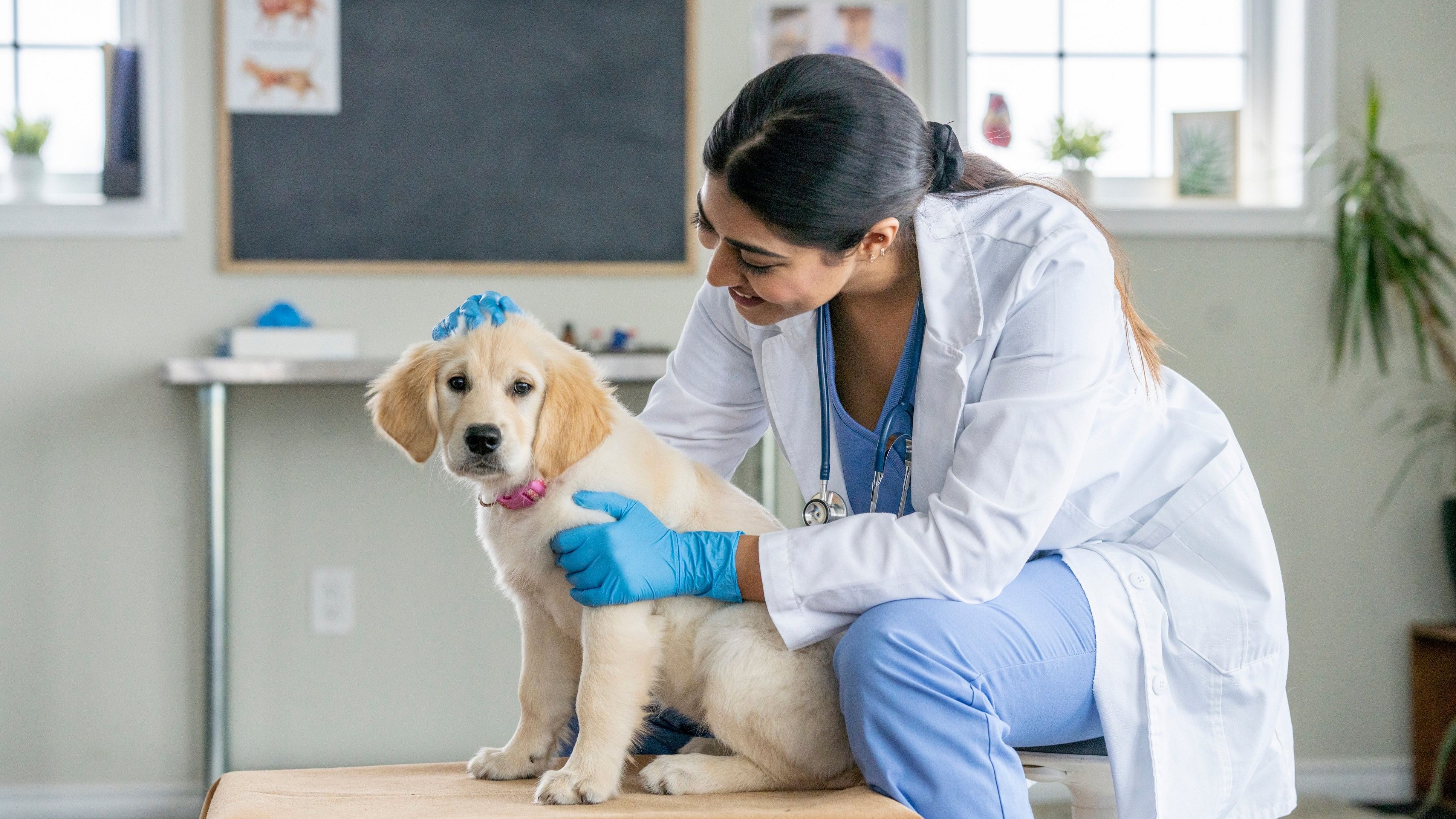
Representative image of a vet
iStock Photo
The population of animals and birds is far greater than that of humans. All living beings require healthcare, medical treatment, and even surgery at times. This is where veterinary doctors and other related professionals come into the picture.
While lakhs of students aspire to become human doctors, not many know they can become doctors of animals through a course called Bachelor of Veterinary Science and Animal Husbandry (BVSc. & AH).
Over 70 colleges nationwide offer this five-year course, including internships. Karnataka has seven veterinary colleges, five of which are run by the government and offer almost 500 seats annually. The fees are very low, particularly in government colleges. Veterinary colleges are affiliated to Karnataka Veterinary Animal and Fisheries Sciences University (www.kvafsu.edu.in).
Some private colleges in other states offer BVSc admission under the management quota based on Class 12 scores without entrance exams, but the fees are higher, ranging up to Rs 5-8 lakh per annum.
Most colleges require 10+2 in Physics, Chemistry, and Biology and clearance for the NEET exam. In Karnataka, the entrance process is conducted by the CET cell (kea.kar.nic.in) after clearing NEET.
Unlike heavy competition for MBBS, even students scoring less than 200 out of 720 in NEET have been admitted to private colleges, while a score of above 400 may get you into a government college. Specialisations are available in many foreign countries for those who wish to study higher. USA, Canada, Australia and New Zealand have many reputed colleges.
Those aspiring to become veterinarians must love animals and have gross and fine motor skills to perform surgery. The task of a veterinary doctor is more challenging than human doctors since animals cannot talk about their symptoms, and the anatomy of every animal is different.
Also, when there are no veterinary nurses or paramedical staff, the doctor has to play those roles. She should be versatile in establishing good communication with the patients by putting them at ease, ascertaining the ailments and symptoms, and ensuring that they do not harm the doctor when they are being treated.
While earlier, most veterinarians sought state and central government jobs in Animal Husbandry Departments as Gazetted Officers, primarily treating cattle and livestock in rural areas, now the norm is for them to practise on their own in larger cities, treating pets.
Similarly, large establishments that rear sheep, cattle, chickens, exotic animals and birds also export animals. This means the animals need to be in perfect health and quality. Many conservation programmes and captive breeding efforts for endangered species require trained animal handlers and doctors.
The Indian Army regularly recruits both men and women Veterinarians as Commissioned Officers. These officers are allotted to the Remount Veterinary Corps (RVC) to care for horses, mules, and camels and process and supply meat to the troops. RVC officers can expect promotions to the level of Colonels and even higher ranks.
Pharma units manufacture various medicines, drugs, and cosmetic products, and veterinarians are employed to aid clinical trials. An understated and underestimated role is that of technicians who maintain animal facilities at universities.
Professors who research certain ‘model species’ and host populations of animals (fish, insects, lab rats etc.) within the university campus often require reliable associates with at least a master’s level education and some experience with animal anatomy.
Non-medical careers
Those who love animals but do not wish to be doctors or do surgery can look for avenues where they do not treat sick animals but spend time nurturing and giving a better life to them. They can become animal trainers, animal psychologists, zoologists, wildlife, environment and ecology preservation professionals, wildlife photographers, managers of wildlife reserves or animal shelters, nutritionists, pet grooming specialists or even combination of two or more of the above.
With a steadily growing awareness of environmental preservation, more and more jobs are becoming available for such professionals. Many pet lovers regard pets as their children and are willing to spend big money on their pets’ upkeep, training, and well-being. Hence, professionals are increasingly in demand. However, to get trained in these professions, there are very few courses in India, and they may have to get their education abroad.
Since animals coexist with us and are essential to survival, working in such fields is very fulfilling and financially rewarding.
Aditya Ganesh, who completed his Master’s in Ecology and Evolution from a reputed European University and is doing fieldwork and research with an NGO in India, highlights that the role of a ‘naturalist’ is a promising upcoming avenue for animal lovers.
Many resorts and homestays, especially those near the bigger national parks with safari possibilities, hire individuals with a master’s level education and good field skills.
Nature education is also receiving much attention. People often need a guide to help them observe the biodiversity in their surroundings. Many schools are including such co-curricular activities for their students.